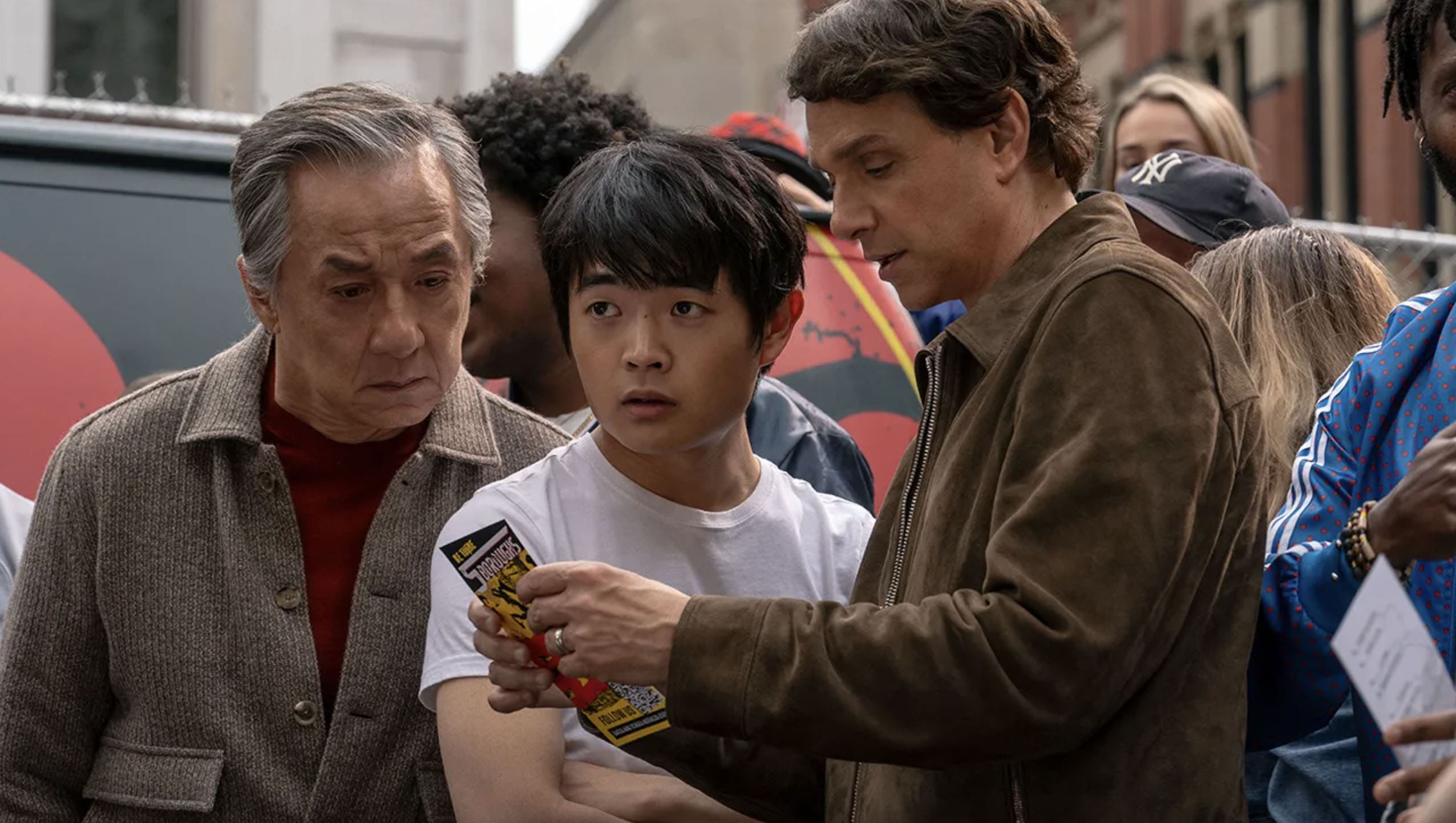
It’s been fascinating to see The Karate Kid build this incredible, decade-spanning legacy that started with the beloved 1984 original and slowly expand through various sequels, a Jaden Smith-starring 2010 remake, and, of course, Cobra Kai. Now, the latest entry, Karate Kid: Legends, acts as the ultimate culmination of everything thus far, bringing together past elements to push a new legacy forward.
Despite Daniel LaRusso (Ralph Macchio) and Mr. Han’s (Jackie Chan) return being the film’s main selling point, the new story and characters make a surprisingly strong first impression. The film follows Li Fong (Ben Wang), a student of Han’s who moves from Beijing to New York City so that he and his mother can get a fresh start. Unfortunately, Li can’t escape the world of fighting that killed his brother and now must hone his skills for a tournament where more than winning is on the line. Even before Li heads to NYC, the film perfectly reintroduces moviegoers to the world of Karate Kid. There’s an amazing opening scene that connects Legends to an important era of the franchise’s legacy and features some stunning anime storytelling. It pays respect to a series legend and offers a heartfelt dose of nostalgia fans will swoon over. It’s also awesome to see how far Han has come: now a master of his own school and creating a legitimate, almost father-figure bond with Li that makes it bittersweet to see them part ways.
From there, Li’s move to the Big Apple becomes this compelling coming of age story that harkens back to the original. Whether it’s the new rivalry, romance, or role Li finds himself in, Legends definitely feels cut from the same cloth as the first Karate Kid film—which can make it overly familiar at times. However, director Jonathan Entwistle keeps things fairly fresh by utilizing some welcomed modern tones and visuals. The music from Dominic Lewis has a synth-y undertone that reflects some of the indie vibes Li’s story (and really the franchise as a whole) has. There’s a great use of splashy colors for text that are visually engaging and add an almost rebellious aura to what’s happening.
More importantly, the fight sequences act as a noteworthy evolution. It’s really awesome to see the combat styles of Miyagi-do karate and Han’s kung fu come together through Li to create a well-ranged combatant. Admittedly, the sloppy camerawork can make for some blurry, tough to follow choreography. But there’s no denying that Entwistle’s vision creates an epic scale for the city-spanning final tournament, and there’s a kitchen fight between Li and an intruder that ranks high for the franchise’s fight scenes.
The more modern approach also seeps into the story and results in Li’s underdog arc quickly becoming a crowd-pleaser. Honestly, for Wang, what a performance. He’s so good at tapping into Lee’s inner turmoil over whether he should fight again while also being an absolute charmer. Whether he’s sharing some playfully romantic banter with his new love interest Mia (Sadie Stanley) or taking on a snarky mentor role with an unlikely student, he’s immensely likable and sells the light-hearted elements of the dialogue. Not to mention, there’s a maturity he brings to the role that elevates a unique twist Legends brings to the franchise’s formula. The story threads surrounding Li teaching some techniques to Mia’s father Victor (Joshua Jackson) are easily the best of the film because Wang and Jackson’s dynamic is amazing. They flip the roles of mentor/student constantly to grow together in touching ways, and their bond has a genuine heart that viewers will tether to. Jackson delivers an unexpectedly knockout performance where he effortlessly exudes New Yorker charm and wisdom with every line. Yet, even with Jackson, Macchio, and Chan surrounding him, Wang shines the brightest and shows himself as the perfect person to bring a newfound physicality and heart to the Karate Kid legacy.
Unfortunately, after an excellent first half, the film becomes unbalanced as it fumbles with thin story threads and rushed pacing. Now, Macchio and Chan aren’t the problem, and, honestly, they carry quite the load. Not only do they bring a warm energy that makes their on-screen meeting a genuinely chill-inducing moment, but they allow the meaning behind the franchise to come through. They fully instill this idea of what it means to fight for something that matters and are the key reason that Legends stays good when things go bad. The rooftop training sequences with these three are worth the price of admission alone and constantly boast potential that’s sadly never fully realized. The film’s breakneck pacing kills any chance for these storylines to breathe and creates a lot of undercooked aspects. Li’s fraught relationship with his mother never gets resolved in a satisfying way. There’s an interesting opportunity to explore the conflicts between Daniel and Han’s style of teaching that sorely missed. Macchio, as a whole, feels very underutilized in a way that’ll annoy fans. And, worst of all, the film’s big tournament is fairly forgettable because we blast through it in the blink of an eye.
It’s so bad that Legends nearly ruins all the great groundwork that’s built early on, and it’s a big reason that it’s tough to be totally high on it as you leave the theater. And yet, the emotion and presence that Wang and company bring to this experience are enough to make longtime fans or newcomers understand why Karate Kid remains so special. Legends is far from perfect, but it provides a necessary big screen return that’s easily enjoyable and injects a fresh energy into the franchise that could make for a thriving new chapter.

